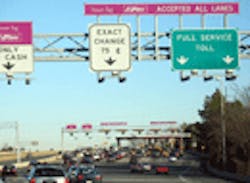A draft of a six-year surface transportation funding bill released late last week by the Obama administration seeks to allow state and local governments more flexibility to impose roadway and bridge tolls and also proposes to create a study group to examine the feasibility of moving to mileage-based user fees as an alternative to using fuel taxes to fund infrastructure needs.
The 60-plus page draft of the bill – dubbed the Transportation Opportunities Act – is being characterized in many circles as a “trial balloon” by the administration to test the political waters on several potentially contentious proposals, especially the wider use of tolls.
Two new toll collection options are being touted as a way to provide more flexibility to finance new construction and capacity and/or manage congestion.
The first option focuses on Metropolitan Congestion Reduction and permits state and local governments to impose tolls on existing Interstate and non-interstate facilities for the purposes of improving or reducing congestion in metropolitan areas with populations over one million people.
Critical caveats to this tolling option is that they must vary in order to manage demand, may only be collected through electronic toll collection systems, and that toll revenues must first be used for the improvement, operation and maintenance of the facilities where the tolls are collected.
The second toll collection option proposed in the draft bill is focused on the national Interstate system, permitting state and local governments to impose tolls for the purpose to initially construct Interstate facilities and/or constructing one or more lanes. Again, any tolls collected under this program may only be collected through electronic toll collection systems and toll revenues may only be used for the improvement, operation and maintenance of the facilities where the tolls are collected.
The bill also seeks to establish and fund a Surface Transportation Revenue Alternatives Office for six years within the Federal Highway Administration (FHWA) to analyze the feasibility of implementing a national mileage-based user fee system. That group will be charged with studying the technologies that might be used to implement mileage-based user charges and deliver a final report at the end of its term detailing what steps would be required to potentially implement such a system.
In an interesting counterpoint, the U.S. Conference of Mayors (USCM) released the results of a 176-city survey concerning the future direction of local transportation infrastructure investments – and calling on the federal government to lower the priority of highway funding in favor of metropolitan needs.
“As the federal government sets priorities for long-term spending and deficit reduction, future transportation infrastructure investments should focus spending on pressing metropolitan transportation infrastructure needs as opposed to low-priority highway expansion projects,” said Atlanta Mayor Kasim Reed, during a conference held at the National Press Club in Washington D.C. today.
“The long-term productivity of transportation infrastructure spending is greater when it is invested where economic growth will occur, which is in the metropolitan areas,” he added.
Among the survey’s major findings:
- 93% of the mayors urge reforms in federal transportation programs to allow cities and their metropolitan areas to receive a greater share of federal funds directly.
- Absent a greater share of funding directly to cities and metropolitan areas, only 7% of the mayors indicate support to increase the federal gas tax.
- 96% of the mayors believe that the federal government should increase spending on transportation infrastructure to reverse decades of underinvestment in cities, with strong majorities indicating support to increase the federal gas tax to improve transportation infrastructure if a greater share of the funding were invested in local road and bridge infrastructure (89%), and public transit (65%).
- 75% of the mayors indicate support to increase the federal gas tax if a greater share of the funding were invested in bicycle and pedestrian projects.
- 80% of the mayors indicate that highway expansion should be a low priority.
“The largest metropolitan areas account for 87% of the nation’s traffic,” noted Tom Corchran, the USCM’s CEO and executive director. “The three most congested areas – Los Angeles, New York, and Chicago – account for 27% of that traffic. Our metropolitan cities… are saddled with bus and rail systems at capacity and aging roads and bridges that will undermine their ability to meet the nation’s future economic output. Given these factors, metropolitan areas should be at the center of federal transportation infrastructure investment.”
About the Author
Sean Kilcarr
Editor in Chief
Sean Kilcarr is a former longtime FleetOwner senior editor who wrote for the publication from 2000 to 2018. He served as editor-in-chief from 2017 to 2018.
